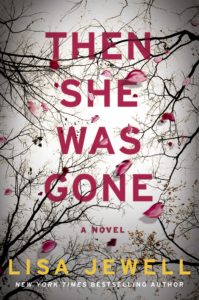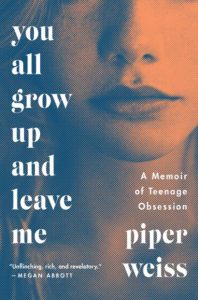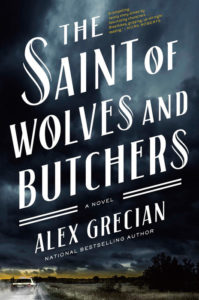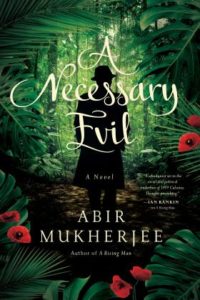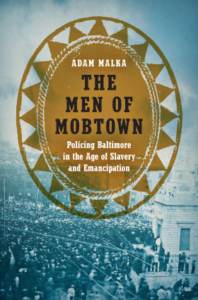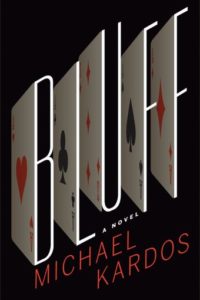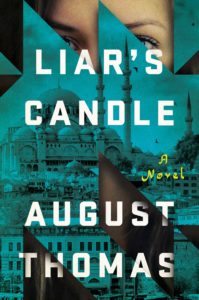At the start of April, the CrimeReads staff makes its recommendations based on what we’ve been reading for an idiosyncratic list of the true crime, thrillers, mysteries, and crime novels not to miss this month. Check back in for more April reading suggestions in the weeks to come.
Lisa Jewell, Then She Was Gone
This satisfying, twisty domestic thriller centers around a woman named Laurel Mack, whose 15-year-old daughter, Ellie went missing ten years ago. The stress of Ellie’s disappearance drove a wedge between Laurel and her husband, who divorced seven months before the action of the book starts. Still processing the traumas of losing Ellie and her marriage, Laurel unexpectedly meets Floyd at a café, and they begin a tentative romance. Even more surprising than her romance with Floyd’s is his daughter, Poppy, who is so much like Ellie it unnerves Laurel: her appearance, her mannerisms, even her voice reminds Laurel so much of Ellie it’s painful. And it raises questions for Laurel about what really happened to Ellie: did she run away, as the police maintain, or did something far more sinister transpire?—Lisa Levy, CrimeReads contributing editor
Sarah Krasnostein, The Trauma Cleaner
The elevator pitch for the trauma cleaner would go something like this: Australian journalist follows woman who owns a cleaning service that specializes in scouring crime scenes, the homes of suicides, and other difficult jobs (quite a few of her clients are hoarders or suffer from mental illness and have to be handled very sensitively). But there’s more: Sandra Pankhurst, the extremely hands-on owner of the service, is a transsexual who left her former wife and sons when she decided to live as a woman. Pankhurst is an engaging, sympathetic, and fascinating person, and Krasnostein does an excellent job of balancing Pankhurst’s personal story with those of her clients.—LL
Piper Weiss, You All Grow Up and Leave Me
Weiss’s hybrid book blends a memoir of an extremely privileged childhood on Manhattan’s upper east side with a true crime story about her tennis teacher, Gary Wilensky, who became fixated on one of his students and killed himself after a failed attempt to kidnap the object of his desire. In researching the book and telling both her own story and Wilensky’s, Weiss tries to make sense of Wilensky’s behavior—the title refers to something he once told her about his charges, that teenage girls inevitably become grown women and put aside their teenage fantasies and desires. As the teenaged Weiss exults in being one of “Gary’s Girls,” looking forward to her lessons and hanging out with Wilensky, who treated his students like adults, the grown woman Weiss obsesses about Wilensky’s habits and his eventual crime, when he tried to bring a girl to an upstate cabin dubbed a “Cabin of Horrors” by the media. You All Grow Up is thoughtful and strikes the right balance between recollections of childhood and the digging the adult Weiss has done in order to make sense of Wilensky’s actions.—LL
Alex Grecian, The Saint of Wolves and Butchers
I first came to Alex Grecian’s work through his historical series set at Scotland Yard, so when I saw he had a new book coming out with a contemporary setting, I had to check it out and see how his signature gothic style transferred to the here and now. In The Saint of Wolves and Butchers, a Nazi hunter travels to the Midwest to track down an aging war criminal, only to discover the Nazi’s crimes didn’t end with the war—and he’s using an evangelical church centered around faith healing as cover for his nefarious Nazi hobbies. My description of the plot may sound lurid, but this is no hackneyed Nazisploitation plot. Alex Grecian grounds his story in the context of rising extremism and neofascism for a relevant and gripping tale. —Molly Odintz, CrimeReads associate editor
Abir Mukherjee, A Necessary Evil
In Mukherjee’s second droll sendoff of the British Raj, his shell-shocked, opium-addicted protagonist and his cricket-bowling partner investigate the brazen assassination of a prince. Provided with a scapegoat, but determined to discover the true conspirators behind the murder, the two policemen pack up their belongings (including a tiny, portable opium kit, for those who enjoy their miniatures) and hop on a train to a distant principality, where they interview a palace full of bejeweled aristocrats, greedy British traders, and imprisoned reformers. —MO
Adam Malka, The Men of Mobtown: Policing Baltimore in the Age of Slavery and Emancipation
In this absorbing history of policing in 19th century Baltimore, Adam Malka uses a close case study to fill out our understanding of the evolution of policing, vigilantism, and property in 19th century America. While works such as the seminal text The New Jim Crow have carefully illustrated how militarized policing and mass incarceration have exploded over the past few decades, leading to the effective lifelong loss of civil rights by millions of people of color, the history of policing as a means of incarcerating disproportionate numbers of African-Americans has its origins in the mid-19th century. True crime isn’t just accounts of those events largely accepted by the wider population as “crimes.” True crime is also the history of the criminalized, of policing, of incarceration, of property, and of state power as manifested in societal control. Baltimore is a liminal city, on the threshold of North and South, with a history marked by intersecting slavery and freedom, mobs and minorities, rights and restriction, making Baltimore the perfect setting to examine power, property, and policing.—MO
Michael Kardos, Bluff
It wasn’t immediately obvious to me that I would love to spend time in the world of washed-out New Jersey close-up magicians, but once I settled into Michael Kardos’ new book I didn’t want it to end. His protagonist, Natalie Webb, is a once promising, now distinctly small-time magician working the close-up circuit in northern New Jersey, playing business conventions and local bars for a few extra bucks. When she crosses paths with a real-deal card sharp, she lets herself get lured into the world of high-stakes poker, making a run at the mark of a lifetime. Hustlers and con artists are two of my favorites in crime literature, especially when one is showing another the ropes. Fans of The Hustler, Rounders, Megan Abbott’s Queenpin and the rest of the gambling/hustling canon will want to check this one out as soon as possible. —Dwyer Murphy, CrimeReads senior editor
August Thomas, Liar’s Candle
Diplomacy thrillers fall right into my wheelhouse. It’s especially fun when a debut thriller comes your way, with all the promise of this and more novels to come. In Liar’s Candle, an intern at the US embassy in Ankara, Turkey, is the sole survivor of a bombing. Forces with her own government and her host country’s both consider her a loose end, and so the chase begins, with a good bit of high-octane fugitive work across the Turkish countryside. There’s a North by Northwest feeling to the action—exciting, but more than a little disorienting—and the Mediterranean-transcontinental locales are more than enough to keep me turning the pages. I’m excited to see what Thomas will write next, and with any luck she’ll stick to diplomatic circles, which don’t in my opinion get enough credit in the world of military and spy-dominated thrillers.—DM
Gilbert King, Beneath a Ruthless Sun
Gilbert King’s new book has the potential to be the historical crime investigation that takes up the mantle from David Grann’s sensation, Killers of the Flower Moon. King looks at the many layers of corruption and mystery swirling around a late 1950s case stemming from the rape of a Florida citrus baron’s wife. A backwards local sheriff railroads a series of suspects, while a crusading journalist pushes ahead in the face of tremendous resistance and secrecy. King’s book unfolds a conspiracy implicating institutional racism, mental healthcare, treatment of the mentally impaired, and the fabric of Southern town life in the buildup to a truly tumultuous era.—DM


